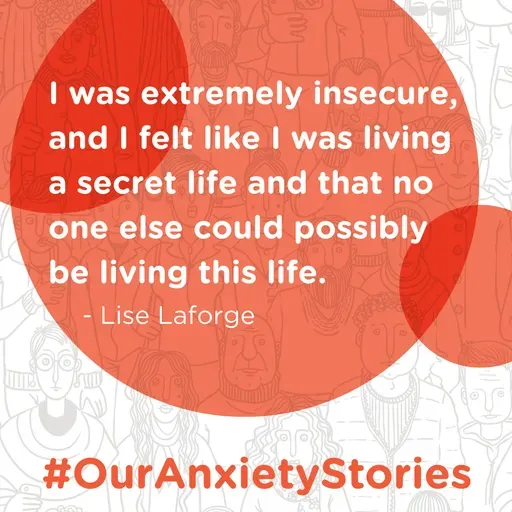
Did you know that anxiety and other mental health conditions, like schizophrenia and depression, can drastically impact the trajectory of a person’s life?
In this episode of #OurAnxietystories, Lise Laforge reflects on her childhood and how it’s connected to her anxiety journey. At age 8, Lise was told she was adopted, which eventually led her to search for her birth mother. At 21, Lise received a call from Children’s Aid to say that they’d found her mother, but the news of her identity sparked an anxiety attack: Lise learned that her biological mother was a homeless woman she’d encountered before. She also learned that her mother had schizophrenia that went untreated for decades and had been a victim of domestic violence. Through learning about her mother, Lise gained a new understanding of homeless communities and some of the root causes of homelessness. Additionally, through therapy and speaking openly about the past, she’s learned to accept her situation and that she is “meant to be on this earth.”
Anxiety Canada Scientific Advisory Committee member, Dr. Kyle Burns, says that this episode stresses the importance of relationships and how these can shape our anxiety. “We often describe anxiety in terms of the ‘fight-or-flight’ reflex and it certainly can be an alarm system for physical threats. But interpersonal anxiety can be just as powerful. As humans, one of our most basic needs is to belong and to connect and we often miss or give greater importance to physical needs. This is an important issue in adoption where the emotional sense of belonging and safety are just as important as food and shelter.” Dr. Burns adds that acceptance is powerful: “John and Lise noted that anxiety is not really ‘cured’ and at the same time, they have both figured out a way to live. Acceptance can be hard to define, but I think it might be helpful for listeners to know a couple of things that acceptance is not. Acceptance is not approval, it is not saying that something is good (or bad, for that matter), and it is also not giving up. Acceptance is a sort of acknowledgement, and at the same time moving forward... How a person comes to a place of acceptance is likely going to be unique and individual, yet it’s stories like Lise’s that can give us some [guidance] on how we can get there.”
If you have a loved one or family member who lives with a mental illness, communicating with them may be difficult. This is because mental illnesses can affect a person’s ability to concentrate or think clearly. BC Schizophrenia Society’s ‘Tips for Communicating with a Loved One who has a Mental Illness,’ is a PDF resource for youth that introduces basic tools for effective communication. This can help families and friends, and people living with mental illness, better communicate with one another.
About the Guest:
After learning she was adopted as a child, Lise Laforge spent years looking for her birth mother, only to deal with a long struggle to accept the shocking truth that her mother was an unhoused person she’d been passing on the street for years. Now, Lise is an advocate for the homeless and the mental health challenges they often disproportionately endure.
***
#OurAnxietyStories is brought to you by Anxiety Canada™, a leader in developing free evidence-based resources, including the free anxiety-management app, MindShift CBT. To learn more about Anxiety Canada, visit www.AnxietyCanada.com.
Anxiety Canada is proud to be a...
